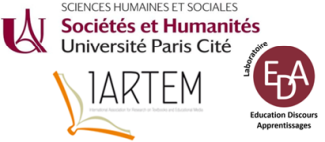Learning about economic crises: a challenge for the development of competences in lower and upper secondary education in Europe. A comparative study of curricula, textbooks and digital educational media
The presentation examines how the curricula and textbooks for lower and upper secondary education in selected European countries develop competence, as critical thinking skills, for understanding the causes of crises and propose solutions for forecast and overcoming crises in the future.
It presents an excerpt from a broader European research project that examines the representation of economic crises in the history curricula and textbooks of the member states of the Council of Europe, the results of which will be published by the end of 2024.
Crises, and in particular economic crises, can be interpreted and taught as societal turning points which can lead to social renewal, despite potentially intensifying polarizations within society and leading to emotional escalations in social debate. The concept of the crisis, particularly when addressed as an open-ended turning point and as a decisive moment in history teaching, rather than as moment of social divergence, provides manifold opportunities for historical learning. Learning about crises can enable students to understand risks and opportunities involved in moments of decision-making and to learn about negotiation and responsibility, when economic crises are not addressed solely to descriptions of the negative consequences, but also deals with proposed solutions and their concrete implementation in social practice. The concept of crisis is particularly suited to helping students develop attitudes, skills and knowledge as well as critical understanding, as formulated in the Reference Framework of Competences for Democratic Culture and in the guidelines for Quality History Education in the 21st Century prepared by the Council of Europe. The development of an understanding of values such as human dignity, fairness or equality in the field of economics, the advancement of attitudes such as curiosity and openness to others or self-efficacy as well as of skills such as empathy, cooperation and conflict resolution and an in-depth critical understanding of economic connectivity are important aspects of the Reference Framework of Competences for Democratic Culture.
To answer the research, question the presentation focuses on the proposed tasks in selected curricula and textbooks and compares the methods and competences developed therein for understanding crises and the solutions the students are asked to evaluate or to develop by themselves. It analyzes tasks in German, English, French and Spanish history textbooks. It looks finally in a comparative perspective which skills for understanding crises and developing solutions forecast and overcoming crises are offered in digital educational media compared to traditional textbooks. To do this, he analyzes selected video games about crises designed for school lessons.
The research design is inspired by the ‘Augsburger Analyse- und Evaluationsraster für analoge und digitale Bildungsmedien' (AAER) (Augsburg analysis and evaluation grid for analogue and digital educational media), which was developed by a research group at the University of Augsburg led by Prof Eva Matthes. The study of the curricula and textbooks follows the criteria of curriculum and textbook analysis developed by the Observatory on History Teaching in Europe (OHTE).
The author is convinced that the methodology presented, as well as the topic of economic crises as a subject of historical political education via history lessons, which is the subject of the research project in the narrower sense, can also be used for the other subjects of social science teaching for the development of skills for understanding crises is important for problem-solving skills and the subject should be taught in a fruitful way across disciplines.
Bibliographical reference
Otto M., Sammler S., Spielhaus R. (2020): ‘„Krisen“ als Seismografen gesellschaftlichen Wandels und Gegenstand schulischer Bildungsmedien‘. In: Handbuch Krisenforschung, Herausgeber:Bösch, F.; Deitelhoff, N.; Kroll, S., Wiesbaden: Springer Verlag 2020, S. 93-108.
Fey C.-C., Matthes E.(2017): Das Augsburger Analyse- und Evaluationsraster für analoge und digitale Bildungsmedien (AAER) Grundlegung und Anwendungsbeispiele in interdisziplinärer Perspektive, Bad Heilbrunn: Klinkhardt 2017.

 PDF version
PDF version
